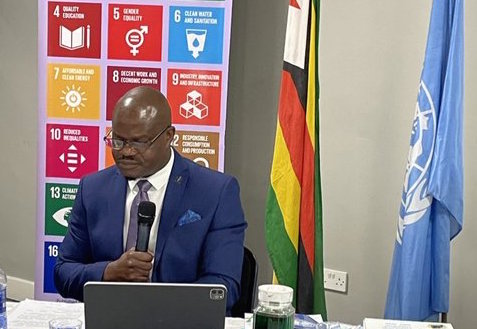|
Getting your Trinity Audio player ready…
|
While the Zimbabwe Lawyers for Human Rights (ZLHR) has come out strongly condemning the brazen bullying of journalists, particularly as elections beckon, Information, Publicity and Broadcasting Services Permanent Secretary Mr. Nick Mangwana has guaranteed the safety of media practitioners under President Mnangagwa’s administration.
Mr. Mangwana pledged the protection of journalists while addressing Masvingo scribes during an engagement meeting where media security was topical ahead of the harmonised elections expected between July and August this year.
“As Government, we want to make it very clear that the safety and security of journalists are guaranteed. Right now the police are moving around the country sensitising all stakeholders on the need to safeguard freedom of information, access to information, and safeguarding the safety and security of journalists,” he said.
In a press release shared on 30 March 2023, the ZLHR said in what amounts to a bizarre act of extraordinary intimidation, one
faceless social media enthusiast, who identifies himself as Tinoedzazvimwe1 on the micro-blogging website, Twitter, blatantly threatened media practitioners and labelled them as “reckless journalists” simply for reporting on the contents of a corruption exposing documentary broadcast by Al Jazeera Investigative Unit and calling on those implicated to be held to account for their
actions.
The social media enthusiast chillingly warned journalists not to repeat and report what is contained in the documentary titled Gold Mafia, which according to Al Jazeera Investigative Unit, was recorded after the “infiltration of four gold smuggling gangs and reveals a giant money laundering and sanctions-evasion scheme in Southern Africa” and warned that some undisclosed “brickbats” would visit those who elect to do so.
“There is no excuse to bully, intimidate, threaten, censure, and endanger media practitioners. Such threats to journalists curtail freedom of expression and freedom of the media, which is one of the most fundamental rights guaranteed in section 61 of the Constitution and also stifles access to information, which is enshrined in section 62 of the Constitution and all of which are vital to a functioning democracy.
“ZLHR is convinced that this stifling of journalists by some self-important gatekeepers, who are desperate to defend and please
some authorities is a failed attempt to stop the publication and consumption of perceived offensive media reports, which apparently reflect the flow of corruption in Zimbabwe. Such gatekeepers need to understand that suppressing journalists will neither change people’s opinions nor generate public support for the commission of corrupt activities,” the ZLHR said.
As part of efforts to ensure the protection of journalists, Mr. Mangwana said the police are moving around sensitising stakeholders that when journalists are doing their work, they are not committing a crime. He added that as long as journalists are staying within the law, they should be protected to do their job.
Mr. Mangwana added that journalists are regarded as “partners and the fourth estate”, hence their characterisation as an essential service during the Covid-19 pandemic, and being among the first group of people to be vaccinated.
The pattern of repression of journalists is not new in Zimbabwe, and ZLHR has, over the years, documented numerous violations by senior government employees and gatekeepers of the late Robert Mugabe and his successor President Emmerson Mnangagwa.
“ZLHR is appalled by the audacity with which journalists are being attacked, and government should not protect authorities or public figures from criticism. Still, it should instead promote space for public debate and free expression in the face of shocking revelations of corruption linked to the pillaging of the country’s natural resources.
“It is worrying to see the space for dissent and providing information of public importance rapidly shrink in Zimbabwe, yet freedom of expression is a cornerstone of democratic rights and freedoms.”
Zimbabwean journalists have faced severe obstacles to executing their professional work for several years, including threats, harassment, intimidation, assault, arbitrary arrest, detention, prosecution, and abduction.
The ZLHR urged Zimbabwean authorities to bring those responsible for the shameless attacks on media practitioners to justice and ensure that all journalists can do their jobs without fear of intimidation or reprisals.
